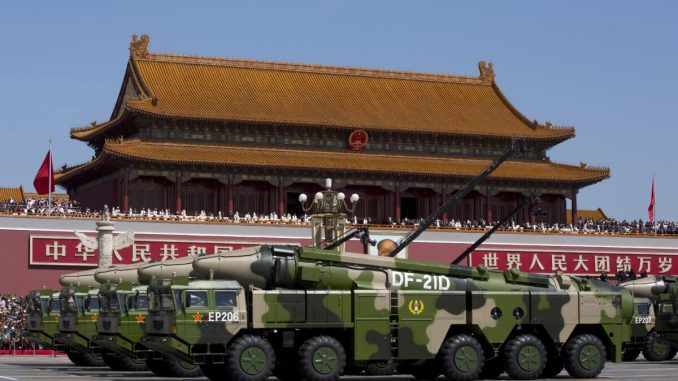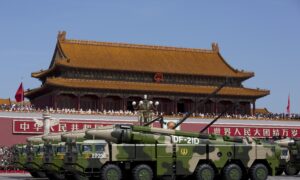

Japan expressed concern over the Chinese regime’s military expansion and its activities in the Indo-Pacific in a foreign policy report released on April 27.
Beijing’s strengthening of its military and activities in the East and South China Seas “has become a serious security concern for the region and the international community,” states the “Diplomatic Bluebook of Japan 2021,” an annual report by the country’s Ministry of Foreign Affairs.
The bluebook highlighted that during the past 30 years, the Chinese regime’s military spending has increased by approximately 44 times. Beijing now has the world’s largest navy. As of early 2020, the U.S. Navy had approximately 293 ships compared to the estimated 350 ships that make up China’s naval force, according to a 2020 Pentagon report (pdf).
The bluebook stated that incursions by Chinese coast guard ships in waters near the disputed Senkaku Islands violated international law by entering Japanese territorial waters. The inhabited islands are located in the East China Sea and are claimed by both Japan and China, which calls them the Diaoyu Islands.
The report also criticized China’s new coast guard law, which allows its maritime law enforcement to fire at foreign vessels.
The statements by Japan came amid escalated Chinese activity in the East and South China Seas. The regime recently sent large vessels believed to be manned by maritime militia to the disputed Whitsun Reef in the South China Sea, prompting protest from the Philippines.
The Chinese regime claims sovereignty to almost the entire South China Sea, despite a 2016 international court ruling that rejected these territorial claims. Brunei, Indonesia, Malaysia, the Philippines, Taiwan, and Vietnam have competing claims in the waterway. The South China Sea, one of the world’s major shipping routes, has been regarded as among the most volatile regions in the world.
The bluebook also expressed concern about the regime’s crackdown in Hong Kong and human rights abuses in the Xinjiang region.
Beijing reacted angrily to Japan’s statement, with Wang Wenbin, spokesperson for China’s foreign ministry, on April 27 saying the bluebook “viciously attacks and smears China and unjustifiably interferes in China’s internal affairs.”
Earlier this month, Japanese Prime Minister Yoshihide Suga met with President Joe Biden at the White House, in Biden’s first face-to-face summit since taking office. The two leaders had serious discussions on the Chinese regime’s influence in the Indo-Pacific, Suga said at the White House on April 16.
“We agreed to oppose any attempts to change the status quo by force or coercion in the East and South China Seas, and intimidation of others in the region,” he said.






Be the first to comment